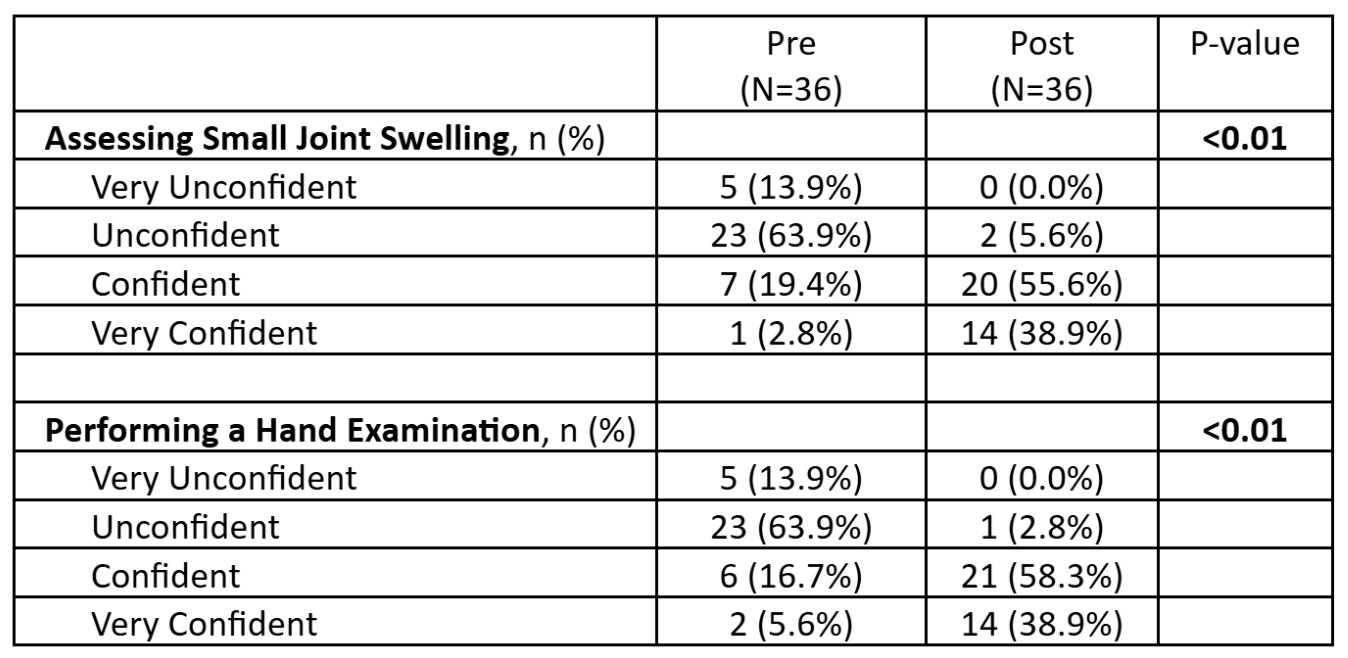Session Information
Session Type: Poster Session C
Session Time: 10:30AM-12:30PM
Background/Purpose: The hand examination is crucial for internal medicine (IM) residents to learn, as it is important for the diagnosis and treatment of patients with inflammatory arthritides. However, there is mounting evidence that trainee confidence in the musculoskeletal examination is low. Moreover, there are limited curricula available to teach the hand physical examination, none of which leverage simulation as an educational strategy. We describe a feasible and effective simulation-based curriculum, utilizing a hand model, to teach IM residents the hand examination and assessment of small joint swelling, as seen in inflammatory arthritis.
Methods: We designed a physical examination curriculum for IM residents rotating through their rheumatology elective. Residents watched a short video, viewed a real-life demonstration, and then participated in hands-on practice with the hand model. Residents then participated in a three-station objective structured clinical exam (OSCE) with clinical vignettes and hand models to assess knowledge. IM residents examined the hand models at each OSCE station and identified sites of perceived palpable small joint swelling on an accompanying worksheet. Afterwards, residents completed a pre-post survey evaluating perceived confidence in performing a hand examination and assessing small joint swelling.
Results: During the duration of the study, 36 IM residents participated in the workshop and completed the survey. There was a statistically significant improvement in resident self-reported confidence in performing a hand examination and assessing small joint swelling (p< 0.01). All IM residents (100%) reported that they would use the skills learned in this curriculum in their clinical practice.
Conclusion: After participating in our simulation-based curriculum, IM residents reported improved confidence in performing a hand examination and assessing small joint swelling as seen in inflammatory arthritis. This workshop is feasible and may be an effective method to teach trainees these important skills. This workshop shows potential for teaching other groups of learners including medical students, early rheumatology fellows, and advanced practice providers. Future studies should compare our simulation-based curriculum with conventional methods in the teaching of the hand musculoskeletal examination.
 The distribution of responses for self-perceived confidence on a 4-point Likert scale before and after our educational initiative. Trainees rated confidence in two specific skills: performing a hand examination and assessing small joint swelling as seen in inflammatory arthritis. Improved confidence was reported after completion of the curriculum, which included a video, live demonstration, hand-on practice, and a 3-station assessment (p < 0.01).
The distribution of responses for self-perceived confidence on a 4-point Likert scale before and after our educational initiative. Trainees rated confidence in two specific skills: performing a hand examination and assessing small joint swelling as seen in inflammatory arthritis. Improved confidence was reported after completion of the curriculum, which included a video, live demonstration, hand-on practice, and a 3-station assessment (p < 0.01).
To cite this abstract in AMA style:
Gad I, Podgorski C, Springer K, Bishnoi a, Zickuhr L. Helping Hands: Curriculum using Simulators to Teach the Hand Exam and Assessment of Small Joint Swelling in Inflammatory Arthritis [abstract]. Arthritis Rheumatol. 2025; 77 (suppl 9). https://acrabstracts.org/abstract/helping-hands-curriculum-using-simulators-to-teach-the-hand-exam-and-assessment-of-small-joint-swelling-in-inflammatory-arthritis/. Accessed .« Back to ACR Convergence 2025
ACR Meeting Abstracts - https://acrabstracts.org/abstract/helping-hands-curriculum-using-simulators-to-teach-the-hand-exam-and-assessment-of-small-joint-swelling-in-inflammatory-arthritis/
